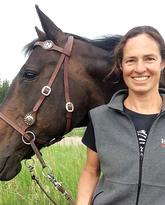
Brielle Rosa
Assistant Professor of Veterinary Pharmacology
Full Member
Associate Member
PhD
DVM
BSc Hons
Contact information
Phone
Location
Courses
- VETM 443 Veterinary Clinical Pharmacology and Toxicology
- VETM 571 Veterinary Pharmacology Clinical Rotation
Preferred method of communication
Research and teaching
Research Interests
- Xenobiotic transport proteins
- Drug metabolism
- Zoopharmacognosy (self-medication by animals)
- Medicinal plants
Activities
Dr. Rosa's lab is currently involved in two major projects:
1. Determining the expression and localization of drug transport proteins in equine tissues, including at blood-tissue barriers such as the blood-brain barrier.
A detailed understanding of how xenobiotics are transported within the body is critical to successful development and use of medications and nutritional supplements; however, in veterinary medicine this knowledge is often lacking. The variety of species treated by veterinarians requires knowledge of species-specific differences in the absorption, distribution, metabolism, and excretion of xenobiotic compounds; processes that are affected by the actions of xenobiotic transport proteins. Species differences may require the use of different drugs, or different doses of the same drug, to treat similar conditions. In spite of their
dual role in society as both companion animals and livestock, horses are particularly neglected in terms of studies of xenobiotic transport. Failure to understand how a medication interacts with the physiology of the horse can lead to treatment failures and adverse effects, but our knowledge of equine XTPs that impact drug disposition is almost nonexistent. My research program aims to rectify this gap and build a comprehensive understanding of equine xenobiotic transport and disposition. This knowledge will provide guidance for dosing of existing medications, allow anticipation of potential adverse effects, and facilitate new drug development.
2. Exploring zoopharmacognosy (self-medication) in feral horses in Alberta, guided by indigenous knowledge of medicinal plants.
Historically, plants have been a source of many medications. Traditional knowledge of medicinal plants used to treat human ailments has led to the discovery of many medically important compounds; however, there has been very little investigation of indigenous knowledge of plant-derived medications for veterinary use. The paucity of recording of indigenous veterinary treatments puts this knowledge at risk of being lost and represents a potentially huge loss to veterinary medicine. Zoopharmacognosy, or self-medication by animals, is another understudied topic. The specific use of medicinal plants by animal species has been most well-documented in primates and there is some evidence that it may occur in other species. Zoopharmacognosy in horses has never been investigated, but there are anecdotal reports of horses eating plants that have little nutritional value but may have medicinal value. In addition, horses are a species that includes both domesticated and wild populations and have been part of indigenous culture in North America for centuries. This work aims to investigate the utilization of medicinal plants that may have value as antiparasitic agents by feral horse populations in Alberta. Selection of target plants is being guided by indigenous knowledge through collaborations with local traditional knowledge keepers and elders. This research may lead to the identification of novel antiparasitic agents, which would benefit both animal and human health.
Biography
Dr. Rosa obtained her DVM from Cornell University (New York, USA) in 2004 and then completed an internship in Ambulatory and Production Medicine. She went on to work in New Zealand at the Massey University Equine Clinic and then obtained her PhD from Massey University in 2014. Her current work in veterinary pharmacology began with sessional instructing and progressed to completing a postdoc in pharmacology before accepting a position as Assistant Professor of Veterinary Pharmacology. As part of her academic appointment, Dr. Rosa also continues to practice part-time as an equine-focused general practice veterinarian in rural Alberta.
